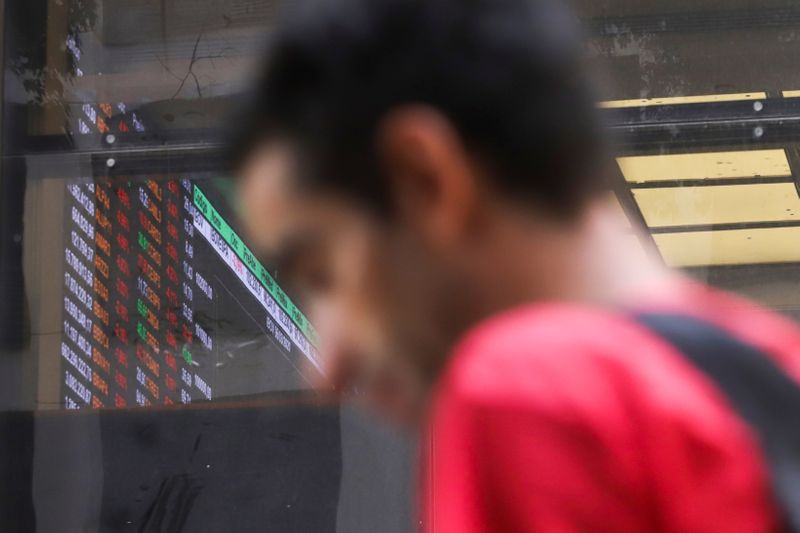BRASILIA (Reuters) – Brazil sold a record $21.5 billion of U.S. Treasuries in March as it battled a stampede of foreign investors out of its markets and a subsequent plunge in the exchange rate, the latest data from the U.S. Treasury show.
Excluding China and Japan, top 10 holders of U.S. treasuries have sold that amount in one month only 12 times in the last 20 years.
In percentage terms, the 7.5% reduction in March has also only been matched less than two dozen times in the last decade.
(GRAPHIC – Brazil U.S. Treasury holdings – monthly change (%): https://fingfx.thomsonreuters.com/gfx/mkt/dgkvlgrwopb/BRUST.png)
(GRAPHIC – Brazil’s U.S. Treasury holdings – monthly change ($): https://fingfx.thomsonreuters.com/gfx/mkt/azgpomqnmpd/BRAZILTIC2.png)
U.S. Treasuries are considered the safest financial asset and one of the most liquid markets in the world. As a result they make up a significant share of countries’ foreign exchange reserves.
The $21.5 billion selloff brought Brazil’s total holdings down to $264.4 billion, and the country’s position down one place in the global ranking to fifth behind Japan, China, Britain and Ireland.
Most of that is held by the central bank.
(GRAPHIC – Brazil’s U.S. Treasury holdings – total: https://fingfx.thomsonreuters.com/gfx/mkt/yzdvxoldlpx/BRAZILTIC1.png)
It countered a $22.5 billion portfolio outflow from Brazil’s stocks and bond markets that month, also a record, as the real lost 14% of its value against the dollar. That was the real’s biggest monthly fall in nine years.
Brazil is poised for its biggest economic downturn this year since records began in 1900. Record low interest rates of 3%, a deepening coronavirus crisis and rising political uncertainty have prompted foreign investors to run for the exits.
To put Brazil’s 7.5% reduction in its Treasuries holdings into context, you have to go back to Belgium and 2015 for the last time any of the 10 largest holders of Treasuries saw a comparable decline in a single month.
There have only been 23 months in the last decade when a top 10 holder of Treasuries reduced their portfolio by 7.5% or more. All but three of those were during the euro zone crisis of 2010-12.
Four of the top 10 – Ireland, Luxembourg, Hong Kong and Switzerland – have never sold $21.5 billion of Treasuries in a single month.
Brazil’s central bank president Roberto Campos Neto said on Wednesday that selling FX reserves is a policy tool the bank is willing to use again if market volatility and liquidity conditions deem it necessary. That will likely mean selling U.S. Treasuries.
“Brazil has a lot of reserves, and as a percentage of GDP they have actually risen because the (FX) depreciation has been greater than the amount we have sold,” Campos Neto said.
“There is a lot of room to sell reserves. We will continue intervening, and may even increase that intervention if we believe it is necessary.”
Brazil’s FX reserves stood at $343 billion at the end of March, down $19 billion on the month. They slipped further to $339 billion in April, the lowest since 2011 and further away from the record high of $388 billion in June last year.
(GRAPHIC – Brazil FX reserves – total: https://fingfx.thomsonreuters.com/gfx/mkt/jbyprjzkrpe/BRFXRESERVES.png)
Brad Setser, senior fellow at the Council on Foreign Relations in New York and an authority on global capital flows, said the pressure on Brazil’s currency and portfolio outflows is likely to persist, albeit not with the same intensity.
If so, selling U.S. Treasuries to relieve some of that pressure remains a logical policy option.
“Brazil can choose to accommodate a shift in portfolio flows out of the country and run down reserves to allow foreigners to exit. The side effect is Brazil will have a smaller reserves buffer going forward,” Setser said.
“Brazil has chosen a policy of low interest rates, so the traditional reason for holding Brazilian bonds has faded. The yield pick up isn’t there. There will come a time when foreigners will come back, but we’re not there yet,” he said.
(Reporting by Jamie McGeever; Editing by Sonya Hepinstall)






















